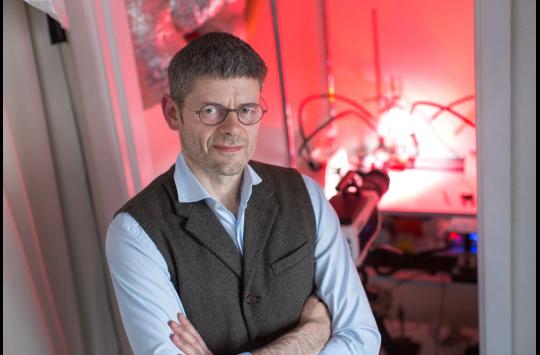Holger Krapp, Professor of Systems Neuroscience
Modern aircrafts are multi-million pound products of unique high performance hardware, cutting edge software, and super computer-based flight control systems. And yet, not even the most advanced aircrafts can pull off aerial acrobatics as impressive as those a humble blowfly produces effortlessly when buzzing round in nature. Lacking the excessive computing power of a modern jet, the fly’s ability to manoeuvre on small spatial scales and to stay stable in the air under a wide range of turbulent flight conditions, is controlled by a brain that is no bigger than a pin head.
The combination of different techniques, which include micro-electrode recordings from individual nerve cells in the fly brain responding to visual motion, and experiments where live flies are placed inside a giant particle accelerator to see the mechanics of the flight motor in action, has brought us closer to understanding how the animals stay stable in the air.
In his inaugural lecture Professor Holger Krapp will explore some of the functional principles that enable flies to reorient themselves or stabilize their gaze, and how the exceptional manoeuvrability they produce could inspire the design of future aircraft or small flying robots.
About the speaker
Holger G Krapp obtained his Diploma in Biology (Neurobiology) from the University of Tübingen, Germany, in 1992 and was awarded the Dr. rer. nat. (PhD) degree for studying the neuronal mechanisms of optic flow processing at the Max-Planck Institute for Biological Cybernetics, Tübingen, Germany, in 1995. During his first postdoctoral position at the same institution he focussed on theoretical aspects and the neuronal basis of self-motion estimation.
In 1996 he became postdoctoral scholar at the California Institute of Technology, Pasadena, USA, working on the biophysical mechanism of neuronal multiplication in the context of visually guided behaviour in locust. From 1997 he spent three years as a postdoctoral research fellow at Bielefeld University, Germany, continuing his work on adaptations to optic flow processing in the fly visual system. In 2000 he commenced a position as a temporary lecturer in Sensory Neuroscience in the Department of Zoology, University of Cambridge, UK, investigating fundamental principles underlying the sensory control of behaviour. He was appointed as a senior lecturer in the Department of Bioengineering at Imperial College London in October 2005 and promoted to reader and professor in 2009 and 2015, respectively.
Inaugural Lectures Programme: Manoeuvrability On The Fly
Lecture theatre 164, Skempton Building, Imperial College London, South Kensington Campus

Ad
Event has ended
This event ended on Thursday 9th of June 2016
This event ended on Thursday 9th of June 2016
Admission
Free
Free
Tags:
Workshops
User Reviews
There are no user reviews
